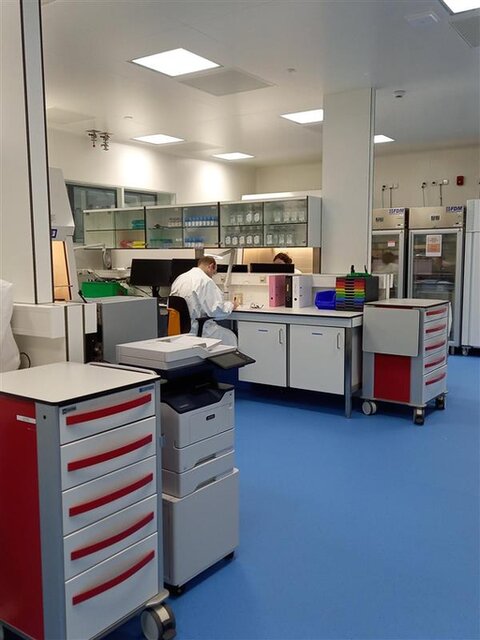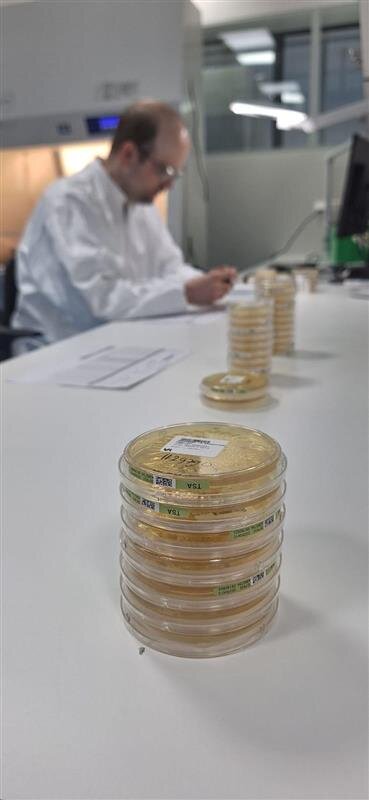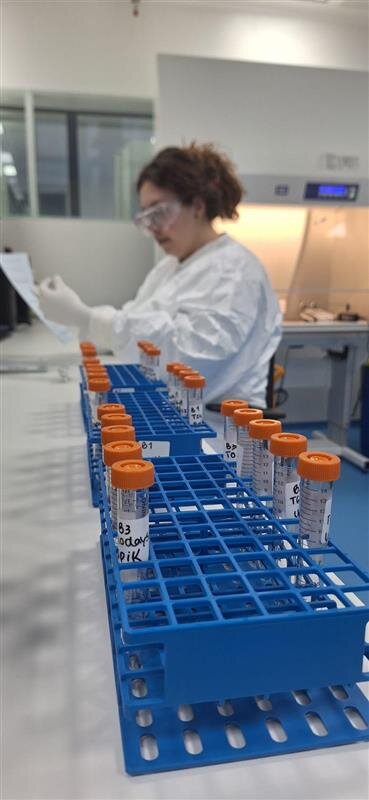Celebrating success in CAR-T innovation and Quality Control
QC Microbiology

Petiulla de Jong in the Hot Room with an APS Bag*
As we welcome another promising year, we are excited to share the developments in 2024 from our QC Microbiology department relevant to the CAR-T process. This innovative therapy marks a new era in cancer treatment, utilizing patients’ own immune systems against malignancies. Here, we highlight our QC Microbiology department’s crucial contributions, showcase the LV-vector Production Facility (Sassenheim), and address the importance of compliance with Annex 1.
A special facility – The Sassenheim facility specializes in producing the Lentiviral Vector Drug Substance for CAR-T treatment, under strict Annex 1 requirements equivalent to a Drug Product (DP), while Leiden focuses on Drug Substance (DS) production with low bioburden. The Sassenheim facility ensures aseptic and sterile manufacturing, involving open product handling and filling vials in a strict Grade A-D environment. This enhances both our capabilities and the quality of our CAR-T therapies.
Commitment to Excellence – Quality Control (QC) is critical at every production stage. At the Sassenheim QC Microbiology Lab, our comprehensive QC testing strategy includes:
- Endotoxin Qualification and Testing
- Bioburden Qualification and Testing
- Environmental Monitoring (EM)
- Utility Monitoring (Gases and Water Systems)
- *Aseptic Process Simulations (APS) / Growth Promotion
- Incoming Gases Sampling
- Biological Indicators

Lab overview
Adapting to New Standards: Annex 1 Compliance
The introduction of Annex 1 has heightened our commitment to sterility assurance via a contamination control strategy (CCS). Key compliance aspects include:
- Sterility Spot Checks: Testing samples for contamination, as a lack of sterility can result in batch rejection.
- Grade A Isolator Monitoring: Ensuring thorough decontamination and achieving a 6-log reduction during performance qualification (PQ).
- Environmental Monitoring: Conducting rigorous surface and air checks during filling processes, with immediate investigations for any failures.
Nearly 10,000 samples – Additionally, we have adopted In Process Control (IPC) protocols, alongside routine environmental monitoring in critical areas. Successful APS runs are vital, requiring three consecutive successful runs before production can proceed.
We have rewritten more than 140 documents to ensure full compliance with Annex 1, and prior to manufacturing the first PPQ batch, we had already tested nearly 10,000 samples. The dedication of our QC Microbiology team enhances the efficacy of our therapies and demonstrates our unwavering commitment to patient safety and quality care.
Celebrating milestones – Let’s celebrate these achievements and unite for a future where our innovations significantly impact the lives we serve. A sincere THANK YOU to everyone in the QC Microbiology department for their critical role in advancing QC for CAR-T therapies and driving excellence!

Read Off
Significant achievements – The Leiden Advanced Therapy Release & Stability Lab in the J-building is focused on bioassays and shipment verification to BioReliance, while the QC Microbiology Lab in building B/C ensures sterility, AVA, and Mycoplasma testing. Together, these labs maintain the safety and efficacy of our CAR-T products.
We are proud to share our significant achievements for 2024, which include the rollout of extensive EM and utility monitoring programs, the qualification of bioburden and endotoxin methods, the testing of our first successful APS runs, and identity testing for incoming gases.
“Our unwavering commitment to patient safety and quality care”

Hold Time Study_2

Petiulla de Jong
Associate Scientist QC Microbiology

Peter Klok
Scientist QC Microbiology

Suzanne Verhaegh
Manager QC Microbiology
Ondertitel
Ondertitel
Ondertitel
Ondertitel